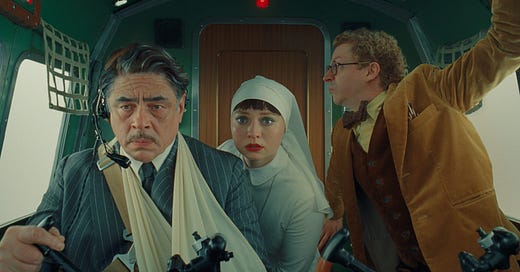The Phoenician Scheme (2025)
Written and directed by Wes Anderson. Starring Benicio del Toro, Mia Threapleton, and Michael Cera.
I have a theory about Wes Anderson’s films.
They’re all about finding or making meaning in life.
Some of Anderson’s characters find that meaning in their work (Monsieur Gustave in The Grand Budapest Hotel), some in politics (Zeffirelli in The French Dispatch), others in sex (Margot in The Royal Tenenbaums), and still others are unable to find it at all, or more accurately, they come to realize that the real meaning is moot, and life should simply be lived, no matter what.
The last example refers of course to Jason Schwartzman’s character in Asteroid City, and I do mean his character, not the character played by his character. In a film that appears at first to struggle to articulate a coherent unifying thesis, Schwartzman tees Adrien Brody up in the third act for the best line in the picture:
SCHWARTZMAN: I still don’t understand the play.
BRODY: Doesn’t matter. Just keep telling the story.
The knee-jerk reaction would be to presume Brody, the director of the play in question, is meant to take on the role of Wes Anderson. However, based on my aforementioned theory, I believe he actually intended his avatar to be Schwartzman. Anderson strikes me as a man perpetually stuck on the question of life’s meaning. After all, if you’ve made thirteen1 feature films, each of which interact with the subject to varying extents, and you still haven’t come to a conclusive solution, then clearly you have yourself quite a quandary.
This is the cause to which I attribute Anderson’s recent tendency towards metafiction. Of his last five films before the subject of this review, four involve stories within stories. Anderson seems increasingly interested in the role of the storyteller in the story itself.2 If I am correct, than this technique is notable by its absence in The Phoenician Scheme. This movie is not metafictional. In fact, it has one of the most conventional plot structures in Anderson’s filmography: Wealthy businessman Zsa-Zsa Korda (del Toro), his daughter Liesl (Threapleton), and his tutor Bjorn (Cera), travel to each of the investors in Korda’s “Phoenician Scheme” to convince them to increase their contributions so that the project can be completed before Zsa-Zsa’s death. In other words, [CHARACTERS] must solve [PROBLEM] before [TIME RUNS OUT]. It’s the quintessential movie plot, a far cry from the meandering character studies for which Anderson is known.
Now my reason for pointing out these significant departures from form is less to support an analytical point about The Phoenician Scheme specifically and more to push back on the broad, pervasive narrative that Wes Anderson just makes the same movie over and over again. Because he is among the most aggressively stylistic of the popular auteurs, his work inadvertently invites such a dismissal, but that makes it no less superficial and no less wrong. In the same way that Nolan’s movies about time are distinct, Joon Ho’s movies about class are distinct, and Spielberg’s movies about having divorced parents are distinct, so too are Anderson’s movies about the meaning of life.
The Phoenician Scheme is unique in his body of work in its centering of a character whose search for meaning has led her to a place it leads a great many people: religion. Liesl, on the cusp of taking her final vows to become a nun, is as much of a protagonist as her father; just as he grapples with the imminent loss of the life he has built on money, she faces a crisis of her own: Should she continue on her path towards the consecrated life, or come to her father’s aid and accept his empire as her inheritance?
Ultimately, she meets neither fate. She and her father lose all of their wealth and content themselves to operate a restaurant, far from their successful Scheme. Yet they are both happy, despite the fact that Liesl is not a nun and Zsa-Zsa is not rich. Both of them have surrendered (voluntarily, significantly) the things that gave their former lives meaning. Now, the source of their meaning is each other: their family.
Family being the be-all and end-all of this pattern-breaking Anderson film is not insignificant. He’s been a parent for nearly a full decade. His only child’s godfather is Bill Murray, who portrays in this movie, get this, God Himself. Neither this critic, nor any critic, can read a filmmaker’s mind with any guarantee of accuracy. However, based upon the context, it wouldn’t be unreasonable to suggest that Wes Anderson’s impossible question is beginning to be answered. The master of dysfunctional families may have come around to the notion of family at last.
This revolution in Anderson’s artistic ideology, if it truly is happening, will put the naysayers completely to shame. His forthcoming work will explore territory never before seen in a Wes Anderson movie. The Phoenician Scheme may be the start of a brand new era.
Twelve if you don’t count the anthology film that compiles his four Netflix shorts. I count it because that’s how they should’ve been released in the first place.
I’m reminded of Scorsese’s much-discussed choice to write himself in Killers of the Flower Moon as the narrator of the final scene.




